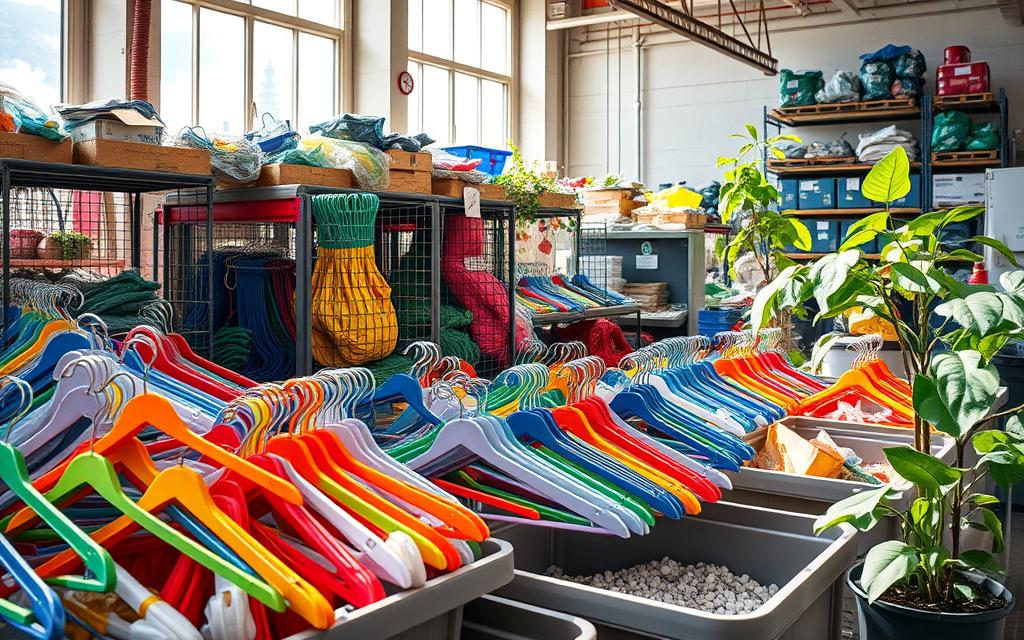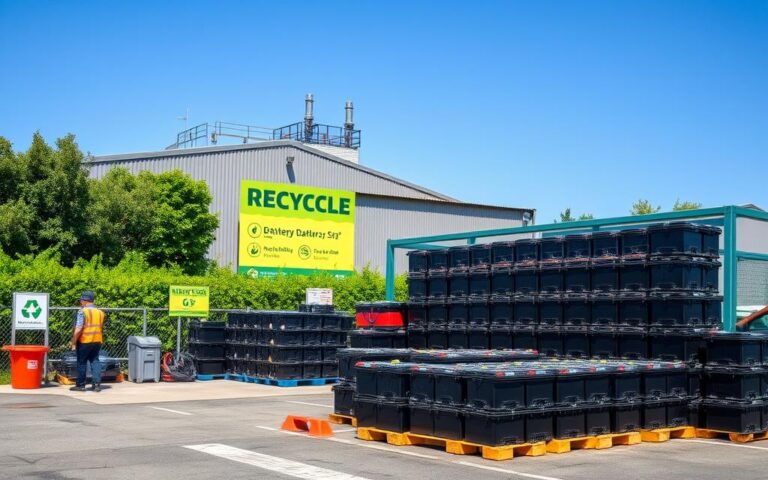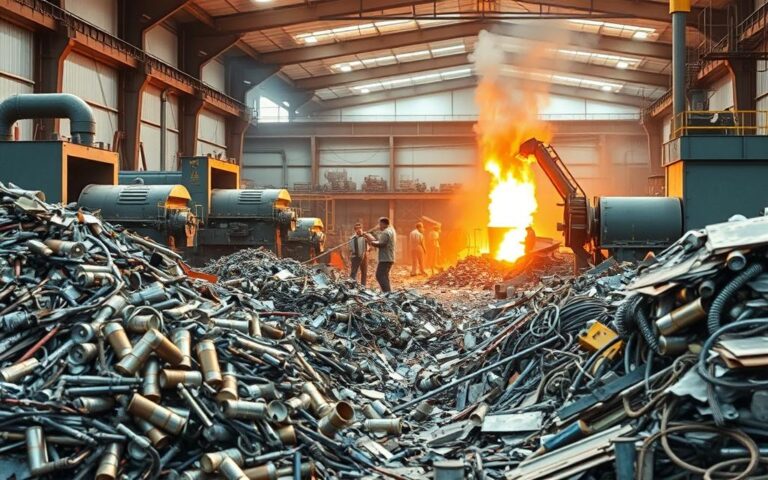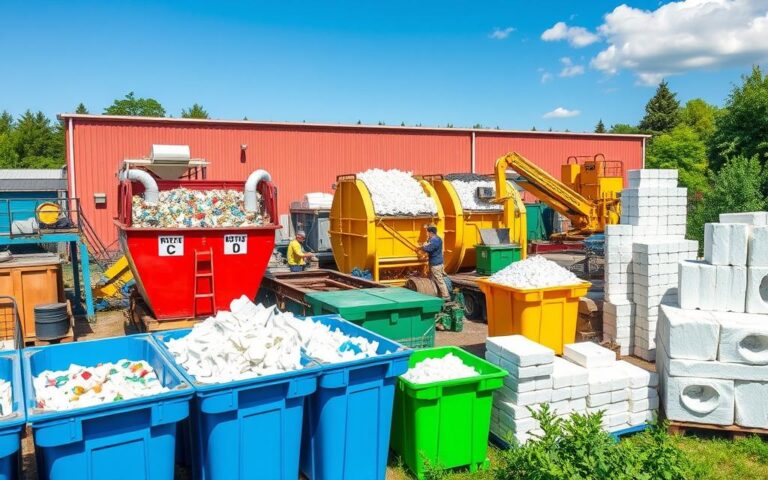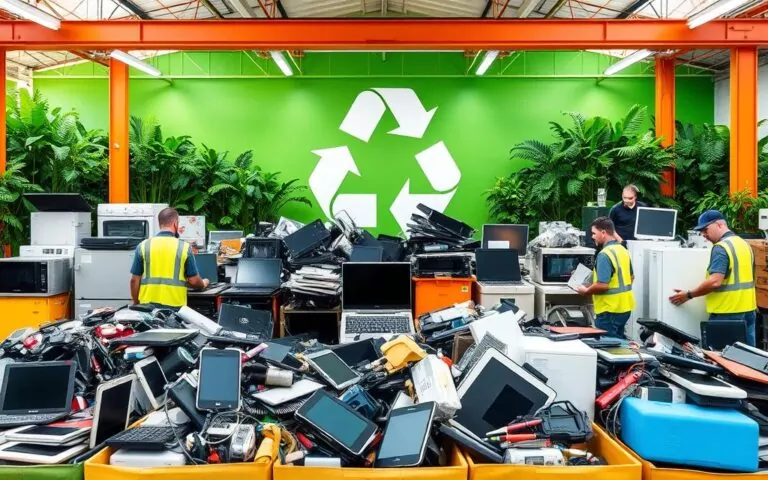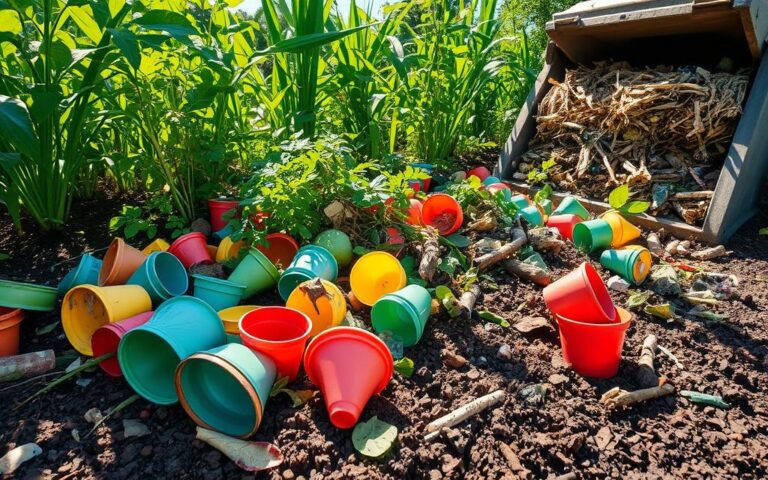Can You Recycle Hangers? Your Recycling Guide
Hangers can be tricky to recycle. In the U.S., about 3.5 billion wire hangers are thrown away each year. This is because they’re made of different materials and can get stuck in recycling machines.
But, there’s a silver lining. Many hangers can be reused, given a new life, or recycled if you follow the right steps.
Key Takeaways
- Plastic hangers are generally recyclable, but many recycling facilities are unable to handle them due to the various types of plastics used.
- Hangers made of mixed materials, such as plastic and metal, are even more difficult to recycle as they require disassembly.
- Retailers can play a crucial role in hanger recycling by collecting them at the point of purchase and ensuring proper disposal or recycling.
- Donating or repurposing used hangers can be an eco-friendly alternative to throwing them away.
- Exploring sustainable hanger options, such as wooden or recycled plastic hangers, can help reduce waste in the long run.
The Environmental Impact of Hanger Waste
Hanger waste is a big problem, with billions of hangers ending up in landfills and oceans each year. About 3.5 billion wire hangers are thrown away in the U.S. alone every year. This shows just how big the issue is.
Understanding the Environmental Consequences
Plastic hangers are bad for the environment because they don’t break down. They also release harmful chemicals as they rot in landfills. Plus, the materials used to make hangers are hard to recycle because they’re mixed.
The fast fashion trend has made things worse. 10 billion hangers are made every year to keep up with demand. This means 8 billion hangers go to waste each year.
| Environmental Impact | Equivalent Waste Reduction |
|---|---|
| Recycling 1 billion hangers per year can reduce CO2 emissions by 79% | Equivalent to the CO2 produced from 10.6 billion plastic straws, 9,000 black London cabs annually, flying around the world 19 times, and producing 4 billion plastic bags |
| Reusing 1 billion hangers per year by high-end and fast fashion brands could save more than 35,000 metric tons of metal and plastic waste from ending up in landfills | Substantial reduction in hanger waste and associated environmental impact |
It’s important to know how hanger waste affects the environment. We need to find ways to make the industry more sustainable and cut down on waste.
“Recycling a hanger 9 times reduces CO2 emissions by 79%, according to research verified by the Carbon Trust.”
Different Types of Hangers and Their Recyclability
Knowing what hangers are made of is key to recycling them. Plastic hangers are common, but recycling them is tricky. Wire hangers are easier to recycle, and wooden hangers have their own recycling issues.
Plastic Hangers: Plastic hangers are everywhere, but recycling them is hard. They’re made from many plastics, which confuses recycling plants. This means most plastic hangers, about 85%, end up in landfills.
- Plastic hangers mix different plastics, making recycling hard.
- Recyclers struggle to sort and process these mixed plastics.
- So, most plastic hangers, about 85%, are thrown away each year, adding to plastic waste.
Wire Hangers: Wire hangers, often with a plastic coating, are easier to recycle than plastic ones. Many places, like dry cleaners and recycling centres, take them for recycling.
- Wire hangers are mostly steel, which is easy to recycle.
- In places like New York City and Riverside, California, you can recycle wire hangers in your bin.
- But, not all recycling places can handle wire hangers because they might damage equipment.
Wooden Hangers: Wooden hangers are a greener choice, but their recyclability depends on their finish.
- Untreated wooden hangers can be composted or recycled.
- But, many have varnishes or paints that make them hard to recycle and bad for the environment.
- Whether wooden hangers can be recycled depends on their exact make-up and local recycling rules.
It’s important to know how to recycle different hangers to reduce waste and protect the environment.
Can You Recycle Hangers: The Truth About Disposal
Many of us use hangers to keep our clothes tidy. But, we often forget about their environmental impact. Recycling hangers is tricky due to several reasons.
Why Plastic Hangers Are Not Recyclable
Today, plastic hangers are very common. But, they’re hard to recycle because of the different plastics used. Mixing these plastics can spoil the recycling process.
The Challenge with Mixed Materials
Hangers are often made from various materials like metal, plastic, and fabric. This mix makes recycling them very hard. Each part needs to be separated before recycling.
Equipment Tangling Issues at Recycling Facilities
Wire hangers can get stuck in recycling machines. This causes problems and slows down recycling. It’s expensive and disrupts the recycling flow.
Because of these issues, recycling centres often can’t take hangers. This means we have to find other ways to get rid of them.
“Of the 8.3 billion metric tons of plastic ever produced, only nine percent has been recycled.”
Recycling hangers is complex and shows we need better waste management. Learning how to recycle properly can help reduce our environmental footprint.
Sustainable Alternatives to Throwing Away Hangers
The humble clothes hanger has become a surprising problem in the fight against waste. Every year, 3.5 billion hangers are thrown away. This huge number calls for new, green solutions. Luckily, there are many ways to reuse your hangers instead of just getting rid of them.
Donating used hangers to local thrift stores or dry cleaners is a simple yet effective action. These places often need reusable hangers. By giving them away, you help your old hangers live on. Also, choose sustainable wardrobe options like wooden or bamboo hangers instead of plastic ones.
For hangers that can’t be fixed, look into eco-friendly hanger options. You can find them made from recycled paper, cardboard, or even wood. These green storage solutions not only cut down on waste but also make your closet look better.
Think about turning old hangers into something new for your home. You can use them for making jewellery or as unique storage. This way, you give your hangers a second chance at being useful and stylish.
By choosing these green alternatives, we can all help lessen the harm hanger waste causes. Every small action towards a greener future counts. Together, we can make a big difference.

Proper Disposal Methods for Different Hanger Materials
Disposing of used hangers depends on their material. Metal hangers can usually be recycled. Plastic hangers are harder to recycle because of their complex make-up and possible contaminants.
Metal Hanger Disposal Guidelines
Metal hangers, like those made of steel or wire, can be recycled at local scrap metal facilities. Some places even pay for these hangers because steel is valuable. Before throwing away your metal hangers, check with your local recycling programme for their rules.
Plastic Hanger Management
Plastic coat hangers are hard to recycle because of their shape and potential contaminants. Only 15% of the 10 billion plastic coat hangers made each year are recycled.
Unless your local recycling accepts plastic hangers, it’s best to throw them away. Some stores, like Target, might have recycling programmes for plastic hangers. It’s good to ask your local stores.
Using sustainable alternatives like wooden or cloth hangers can help the environment. You can also donate old hangers to local dry cleaners, thrift stores, or community centres. They might be able to use them again.
“Recycling plastic coat hangers can help reduce plastic waste in landfills, microplastics in the ecosystem, toxins from degrading plastic, and plastic contamination in water bodies.”
Knowing how to dispose of different hanger materials helps make waste management more sustainable and responsible.
How to Reduce Hanger Waste in Your Home
Reducing hanger waste needs a big change in how we live. We must adopt sustainable habits and embrace minimalism. This way, we can cut down on the hangers we throw away each year.
One easy step is to stop buying plastic hangers. These hangers often end up in landfills, making up 85% of all hanger waste. Instead, choose durable hangers that last longer, so you don’t need to replace them as often.
- Go for metal or wooden hangers over plastic ones. They’re better for the planet and can be recycled or reused.
- Think about using shelves or bins to store clothes instead of hangers. This can help you use fewer hangers.
- Keep your wardrobe simple by getting rid of clothes you don’t wear. This helps reduce waste and supports a greener lifestyle.
By following these waste reduction tips and sustainable living ideas, you can help make your home more eco-friendly. Every small change you make can help create a better future.
“The true measure of any society can be found in how it treats its most vulnerable members.”
| Hanger Type | Recyclability |
|---|---|
| Metal or Wire Hangers | Generally made from steel, which is highly recyclable. Some recycling facilities accept them, while others may refuse due to their shape. |
| Plastic Hangers | Most plastic hangers are made of #6 or #7 plastic, which are not recyclable. They often end up in landfills, contributing to the 85% of plastic hangers that are discarded. |
| Wooden Hangers | Wooden hangers, often coated in varnish, are also unrecyclable and should be avoided when possible. |
Donation and Reuse Opportunities
Dealing with old coat hangers can be tough for many families. But, there are green ways to tackle this problem. You can work with local dry cleaners who might reuse your hangers.
Working with Local Dry Cleaners
Dry cleaners need coat hangers to store and move clothes. By contacting your local dry cleaners, you can ask about their hanger recycling or reuse plans. Many are eager to take your hangers, keeping them out of landfills.
Thrift Store Donation Guidelines
Donating your hangers to thrift stores or charities is another smart move. Some thrift stores might want clothes already on hangers, but others are okay with separate hangers. Always check with the store first to see what they prefer.
You can also look into local recycling programmes or use online platforms like Craigslist or Freecycle. These options help reduce waste and support sustainable fashion and community projects.
FAQ
How many wire hangers are discarded annually in the U.S.?
About 3.5 billion wire hangers are thrown away in the U.S. every year.
What are the challenges with recycling hangers?
Recycling hangers is tough because they’re made of mixed materials. Plastic hangers can’t be recycled because they’re made from different plastics.
Can used hangers be returned or donated?
Yes, you can return or donate used hangers. Take them to dry cleaners or thrift stores if they’re still good.
What are the environmental consequences of hanger waste?
Hanger waste is a big problem. It adds to plastic pollution and fills up landfills. Knowing this helps us find ways to reduce waste.
How can I dispose of different types of hangers responsibly?
Metal hangers can be recycled with scrap metal. Plastic ones should go in the trash if they can’t be recycled. Always check with your local recycling center for the best way to dispose of hangers.
What are some eco-friendly alternatives to using hangers?
Choose hangers that last longer and are made from green materials. Look into other ways to store clothes that don’t need hangers, like keeping your wardrobe simple.

